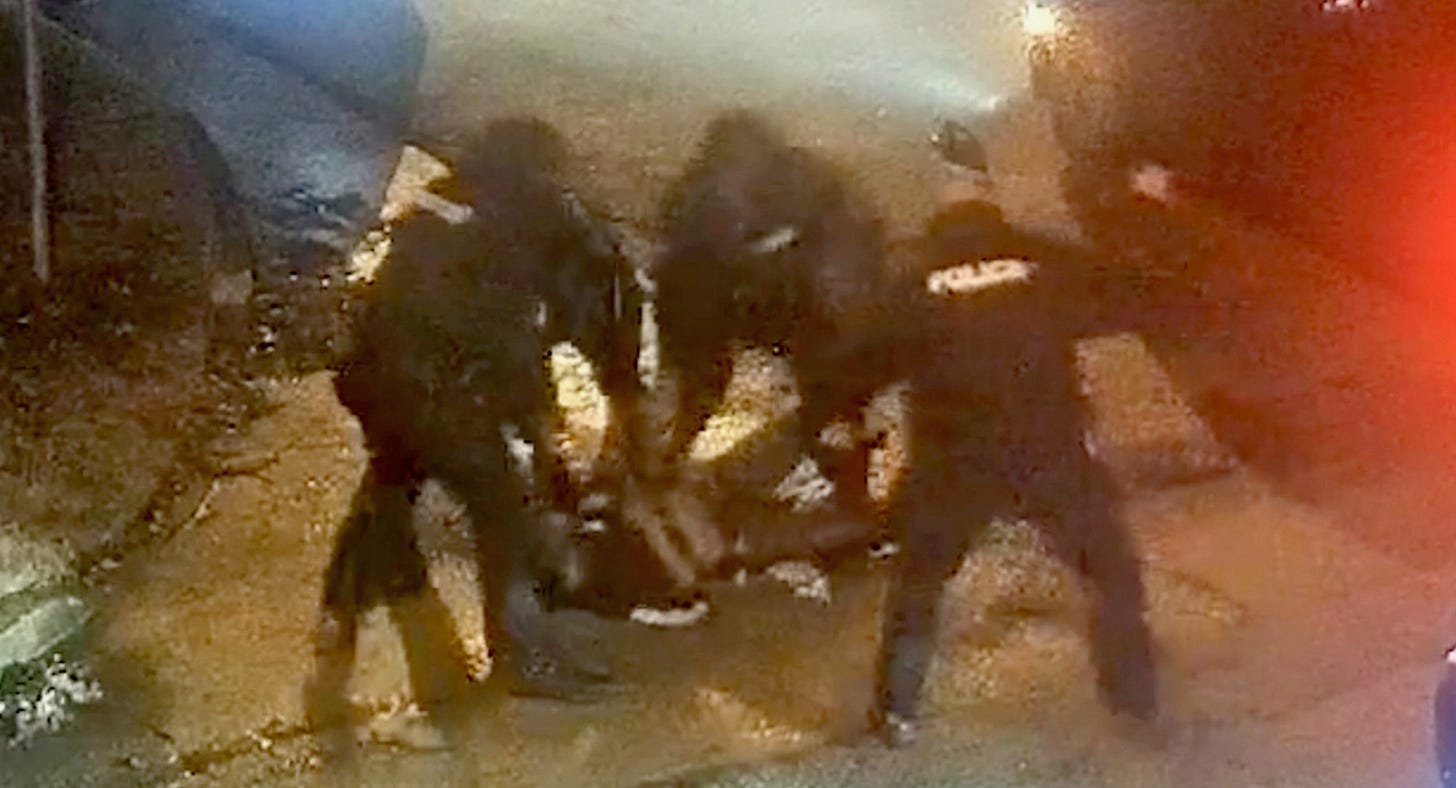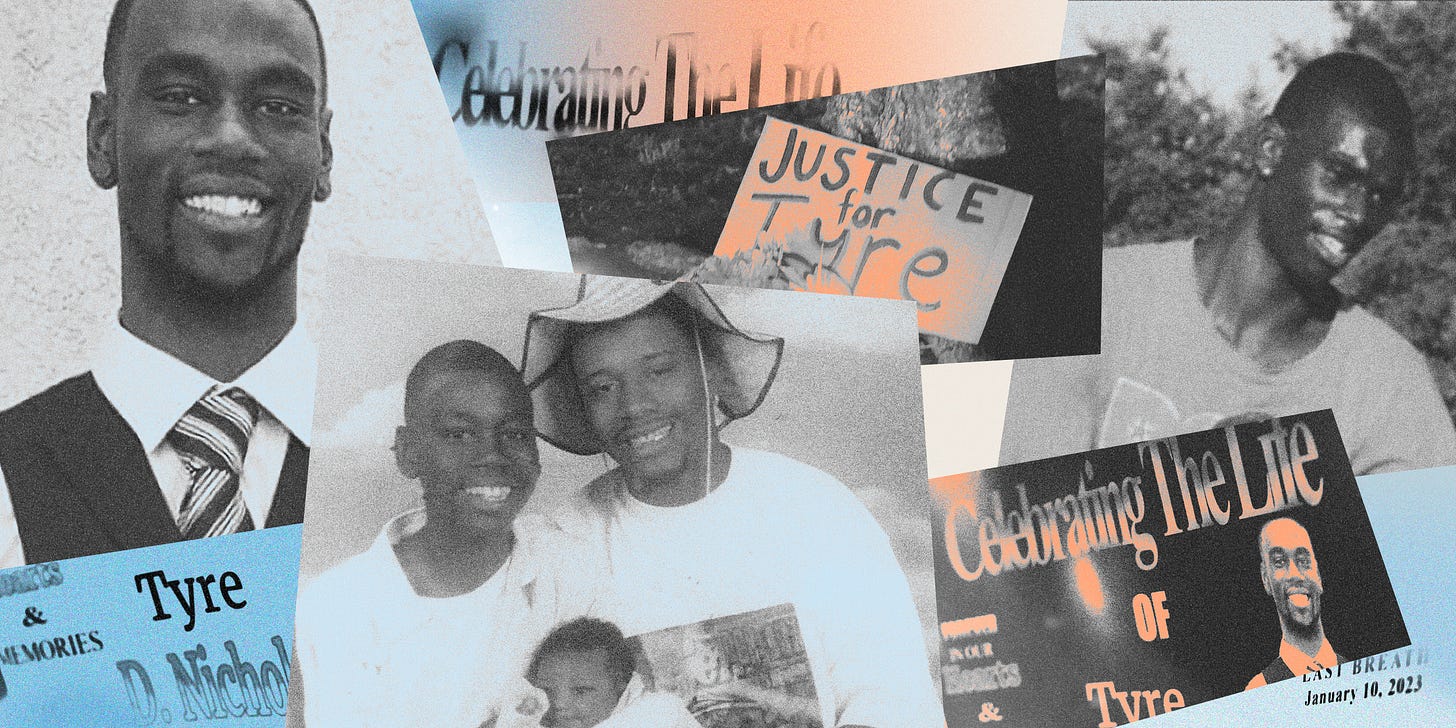What they did to Tyre Nichols was terrible. The footage is so painful to watch because it’s just a beating, it’s just five men using their feet, fists, and batons to murder another man who isn’t fighting back. And the men doing it are police, and it’s so much worse because they’re police. They don’t just have weapons and superior numbers, they also have legitimacy. They’ve been empowered by the community to protect the community, and they’re using that power to terrorize it. They’ve become terrorists.
Of course this isn’t the case with all cops, but in a sense it is. Are these cops really so different? Are they really so singularly evil? They were five young men, all of them relatively new to the job, and they suffered the same anger, doubts, and frustration that everyone suffers. And they decided to take it out on another human being in the dead of night. Because they could. But what were they like during the day? Were they really so different from you or me?
A police officer’s job is to stand in the middle of violence and keep the peace. What does it take to do that job? Besides knowing the laws and protocols, what does it take to be a “peacekeeper”?
Certainly equanimity is required — how do you stand in the face of the most intense disputes and keep your cool? And empathy is also needed — to serve and protect the community, you have to care about it. And one has to be truly inspired by justice and peace, inspired enough to give your life for those ideals, because the job is dangerous.
And these are all inner capacities. They take time to develop. They awaken in one’s education, or they don’t. They live in the culture of an organization, or they don’t. But without them real peacekeeping is impossible.
The power we give to officers is meant to serve the community, but it also has its shadow side. It can be used to dominate. It can be used as power over others. Instead of keeping the peace, cops can become the aggressors.
And aggression is clearly a part of the culture of policing. Just look at the officers in the Tyre Nichols case — young men driving around muscle cars as part of an “elite” crime fighting unit known as “Scorpion.” Yes, Scorpion. It stands for “Street Crimes Operations to Restore Peace In Our Neighborhoods.” A group meant to restore peace is called Scorpion. What could demonstrate more clearly the bipolar nature of policing?
So what do we do about it? It’s hard to watch the murder of Tyre Nichols and imagine that trust in the police could ever be restored. How could a person of color who was pulled over at night, not be afraid for their lives? And how could that fear not fester into bitter distrust and rage?
The idea of replacing some of the police with more specialized response units (focused on mental health, substance abuse, houselessness, etc.) makes sense. And though the cops in the Tyre Nichols case were all Black, still it makes sense to have police departments that reflect the ethnicity/culture/race of their community. It’s simply more likely they’ll be able to understand and empathize with the people they’re serving (though of course anyone can develop empathy for other groups and should have the opportunity).
But will that really do it? Is it even close to enough? Do we imagine such measures will heal the divide between the public and the police, or is something more radical needed? Trust is just so hard to build and so easily broken. For every person who has a positive encounter with the police, there are thousands and thousands who watch a video like this and curse them.
So here’s another idea — bring the public into the police. Our life is ruled by laws that we have no say in making or enforcing. We elect politicians to represent us and let somebody else’s children guard our streets and die in our wars. But a democracy is meant to be self-governing. We should be doing these things.
Most people might be willing and even excited to be a citizen legislator, randomly selected to make or review new laws, but who would want to risk their lives in the military or police? I wouldn’t. But maybe we’d relate to these things differently if we had a hand in them. Maybe we wouldn’t rush into so many wars if we knew what it really took to wage them. And maybe we’d relate to our communities differently if we all had a role in policing them, even just a minor role (for instance, as observers).
We leave the task of governing to others and so everything’s always out there, outside of us. Corrupt politicians, criminals on the streets, violent cops — it’s all bad and someone needs to fix it. But what if we need to fix it? What if we need to get involved? What if society can’t heal until government becomes a place where everyone participates as equals, experiences each other’s struggles, and comes to recognize one another’s dignity in the face of so much difficulty and pain.
Tyre Nichols was a skinny 29 year old who worked at Fed-Ex. He loved skateboarding and his 4 year old son. At one point he thought about becoming a cop because he thought maybe he could help change the system from the inside. But what if what’s needed is to turn the system inside out? To make it so that it’s no longer “us” and “them” — the community, cops, and criminals — but just “us.”







Thank you for this compassionate, measured view of a seemingly intractable problem. Your insights and suggestions are, in my mind, right on. I'll probably sound old when I say this, but... there was a time when police officers WERE part of the community, back before the militarization of so many forces. Officers knew the neighborhoods they patrolled, on foot, and they gained the trust of those area's inhabitants.
Now we've got specialized, armed-to-the-teeth individuals who have no personal connection to the neighborhoods, riding around in cars with the windows rolled up. "Scorpion?" Really?? What do we expect?
Well said. And important to say. 'Community policing' reframed as the community policing ITSELF. We can feel galling contempt when someone we see as lower than us is not being deferential to our superior self-anointed status. It's available to all of us to act on - even as parents and teachers it is possible to misappropriate our power under the cover of 'discipline' when we feel a child is being insubordinate. I believe that our sense that we have the right to don a 'uniform and gun' attitude to enforce uniformity on others is the shadow side of our appropriate sense of self and human worth. I can find it in myself and believe its a shared but potentially transformable flaw of human (inhuman?) nature.. Your suggestions are a start,. Thank you.